|
|
|
Sort Order |
|
|
|
Items / Page
|
|
|
|
|
|
|
| Srl | Item |
| 1 |
ID:
062314
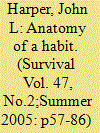

|
|
|
|
|
| Publication |
2005.
|
| Description |
p57-86
|
| Summary/Abstract |
The manner in which and the reasons for which the United States went to war against Iraq in 2003 do not represent a radical departure from the past. American history shows that the United States has had a strong propensity to become involved in unnecessary wars. These wars share some common characteristics: they were justified in the name of America’s presumed historical mission; they were entered into on the basis of false premises; a relatively small ‘war party’ was indispensable to the decision to go to war; the two-party democratic competition frequently acted as a stimulus to military action; the wars exhibit a kind of ‘law of unintended consequences’
|
|
|
|
|
|
|
|
|
|
|
|
|
|
|
|
| 2 |
ID:
062317
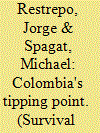

|
|
|
|
|
| Publication |
2005.
|
| Description |
p 131-152
|
| Summary/Abstract |
Álvaro Uribe assumed the presidency of Colombia on 7 August 2002, riding a wave of general dissatisfaction with the country’s increasingly violent conflict. Uribe’s ambitious plan to gain control over lawless territories and provide security to all sectors of society based on an expanded military and police presence and the creation of networks of civilian support has been controversial and has faced particularly fierce censure from human-rights organisations. Yet polemics have obscured some underlying facts about the conflict. It is possible to measure what is going on in terms of violent attacks, armed clashes, deaths and injuries. Such metrics, analysed rigorously, show incomplete but nonetheless unmistakable evidence that the Uribe government has had significant success in fighting the guerrillas while reducing civilian deaths.
|
|
|
|
|
|
|
|
|
|
|
|
|
|
|
|
| 3 |
ID:
062319
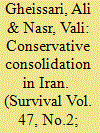

|
|
|
|
|
| Publication |
2005.
|
| Description |
p175-190
|
| Summary/Abstract |
Over the past eight years Iran’s conservative leadership has effectively tightened its hold on power, thwarting attempts at political reform. It has centralised decision-making, strengthened the Revolutionary Guard, invested in new strategic weapons, built ties of patronage and effectively used economic levers to assert control. The conservatives’ consolidation of power now constitutes the framework of Iran’s power politics, which will in turn determine the nature and scope of internal political developments after the 2005 presidential elections, the country’s response to outside pressures regarding the nuclear issue, and the kind of government towards which the Islamic Republic is likely to evolve.
|
|
|
|
|
|
|
|
|
|
|
|
|
|
|
|
| 4 |
ID:
062318


|
|
|
|
|
| Publication |
2005.
|
| Description |
p153-174
|
| Summary/Abstract |
Protracted refugee situations are a critical and growing element in continuing conflict and instability, especially in Africa. Such situations can result in direct security concerns, including the presence of armed elements within the refugee population and the spill-over of conflict across borders, and indirect security concerns, as tensions rise between local populations and refugees over the allocation of scarce resources. Somali refugees in Kenya and Burundian refugees in Tanzania constitute two of the most challenging protracted refugee situations in Africa. The overall response to protracted refugee situations remains fragmented, compartmentalised and ineffective. What is required is a new policy agenda that extends beyond conventional boundaries and seeks to integrate the resolution of chronic and recurring regional refugee problems with economic development and security issues.
|
|
|
|
|
|
|
|
|
|
|
|
|
|
|
|
| 5 |
ID:
062312
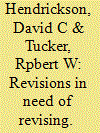

|
|
|
|
|
| Publication |
2005.
|
| Description |
p7-32
|
| Summary/Abstract |
Though critics have made a number of telling points against the Bush administration’s conduct of the Iraq war, the most serious problems facing Iraq and its American occupiers – criminal anarchy and lawlessness, a raging insurgency and a society divided into rival and antagonistic groups – were virtually inevitable consequences that flowed from the act of war itself. Military and civilian planners were culpable in failing to plan for certain tasks, but the most serious problems had no good solution. Even so, there are lessons to be learned. These include the danger that the imperatives of ‘force protection’ may sacrifice the broader political mission of US forces and the need for scepticism over the capacity of outsiders to develop the skill and expertise required to reconstruct decapitated states.
|
|
|
|
|
|
|
|
|
|
|
|
|
|
|
|
| 6 |
ID:
062320


|
|
|
|
|
| Publication |
2005.
|
| Description |
p191-214
|
| Summary/Abstract |
Recent anti-Japanese disturbances in China remind us that the two countries are locked in a difficult relationship, with heavy historical baggage. Although there are glimmers of Chinese ‘new thinking’ about Japan, the history issue, deep societal antipathy and substantial strategic divergences keep the political relationship from progressing the way the bilateral economic relationship has grown. Japan is not likely to re-emerge as a great power or discontinue its alliance with the United States, despite the steady expansion of the Japan Self-Defense Forces. Japan–China tensions therefore simmer on, with the risk that a crisis over Taiwan or some other issue will plunge the East Asian giants into a cold war.
|
|
|
|
|
|
|
|
|
|
|
|
|
|
|
|
| 7 |
ID:
062313


|
|
|
|
|
| Publication |
2005.
|
| Description |
p33-55
|
| Summary/Abstract |
The Coalition Provisional Authority (CPA) in Iraq was a civilian administration conjured up from almost nothing after the initial conflict was already over. It was inevitable that it should have suffered from grave shortcomings in management, organisation, staffing, direction and resources. But some of these were avoidable. While governments and the headquarters in Baghdad focussed on high political and constitutional matters and the organisation of large-scale contracts, CPA staff on the ground elsewhere faced very different challenges with which they were ill equipped to deal. The prevailing security environment was the key to all other activity, but there was a close relationship between this and progress over reconstruction, the development of local as well as national government, and the perceptions of the Iraqis.
|
|
|
|
|
|
|
|
|
|
|
|
|
|
|
|
| 8 |
ID:
062315


|
|
|
|
|
| Publication |
2005.
|
| Description |
p87-100
|
| Summary/Abstract |
For most of the past century in the Middle East, European powers like Britain and France were self-confident, interventionist, militaristic and prone to unilateral action. The Americans, on the other hand, were sympathetic to the locals, committed to compromise and strong supporters of international law and the United Nations. Now it’s the other way around. As case studies from Iran, Iraq, Algeria and Egypt show, the two sides have effectively traded places, as a result of their changing roles in the international system. The fact that Americans are now walking in European footsteps does not mean that they will suffer the same fate as their predecessors. If America can avoid the temptation to act like an imperial power and legitimise its efforts by promoting democracy and winning international support, it might also be able to avoid the resentment and violent resistance that doomed the British and French.
|
|
|
|
|
|
|
|
|
|
|
|
|
|
|
|
| 9 |
ID:
062328
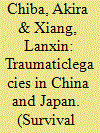

|
|
|
|
|
| Publication |
2005.
|
| Description |
p215-232
|
| Summary/Abstract |
In April 2005 the long-running animosities between China and Japan erupted in a wave of anti-Japanese protests in Shanghai, Be?ing and other Chinese cities. Japan reacted angrily. The protests subsided, but the disputes are unresolved over Tokyo’ bid for a permanent seat on the UN Security Council, the treatment of Second World War history, the Japanese prime minister’ visits to a shrine honouring Japan’ war dead (including 14 Class A war criminals), and more contemporary strategic tensions. Some weeks before the latest eruption, two old friends – Lanxin Xiang, a Chinese professor of history at the Graduate Institute of International Studies in Geneva; and Akira Chiba, assistant press secretary at the Japanese Foreign Ministry – engaged in a lengthy e-mail exchange to discuss their worries about the direction of Sino-Japanese relations. An edited version of their exchange appears below. (Some of the discussion involves Chinese and Japanese words and the ideographs used to represent them; to distinguish the ideographs from the words themselves, the former are in small caps.)
|
|
|
|
|
|
|
|
|
|
|
|
|
|
|
|
| 10 |
ID:
062316


|
|
|
|
|
| Publication |
2005.
|
| Description |
101-130
|
| Summary/Abstract |
Despite its strengths and electoral appeal, the US doctrine on the ‘war on terror’ takes too little account of the history of the subject. The struggle should be presented, not just as a fight against evil or as a defence of freedom, but also as a fight against tragically erroneous ideas. It should be seen as a means of ensuring that the societies from whence terrorism comes do not succumb to endemic violence. It needs to encompass close attention to after-care in societies that have been torn apart by terrorism. An important aim must be the relegation of terrorists to a status of near-irrelevance as long-standing grievances are addressed and peoples can see that a grim terrorist war of attrition is achieving little and damaging their own societies
|
|
|
|
|
|
|
|
|
|
|
|
|
|
|
|
|
|
|
|
|